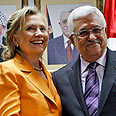Abbas seeks Security Council meeting on settlements
After Israel says will move forward with plan for 1,300 housing units in east Jerusalem, Palestinians say, 'Something must be done on international level to halt settlement expansion.' Clinton calls settlement construction 'counterproductive,' says US to give PA additional $150M
Palestinian President Mahmoud Abbas has asked for a UN Security Council meeting to discuss Jewish settlement building on "occupied" land in the West Bank where the Palestinians aim to found a state.
Israel said on Monday it would go ahead with plans for 1,300 new apartments on land in and around Jerusalem which was annexed by Israel following the 1967 Middle East war. A further 800 housing units were planned for the settlement of Ariel in the northern West Bank.
"Something must be done on the international level to halt the settlement expansion which the Israeli government is undertaking in the West Bank, including Jerusalem," Nabil Abu Rdainah, the spokesman for Abbas, said on Wednesday.
Abbas had instructed his delegate to the United Nations, where the Palestinians have observer status, to request the meeting, he told Reuters.
Palestinian sources told Ynet that during Prime Minister Benjamin Netanyahu's meeting with US Secretary of State Hillary Clinton on Thursday, the Americans will present a new formula for the resumption of peace talks.
The sources said the formula will apparently not call for a complete settlement construction freeze but will try to limit Israeli building projects in the West Bank.
Clinton said on Wednesday that the United States will give an additional $150 million to the Palestinian Authority as Washington seeks to boost the fledgling government amid an impasse in peace talks with Israel.
The US secretary of State made the announcement in a joint video conference with Palestinian Prime Minister Salam Fayyad, who has been scrambling to fill a huge projected budget hole as his government expands services in expectation of full eventual statehood.
She told reporters Israel's plan to go ahead with more settlement building in the West Bank was counterproductive to peace negotiations, but said a peace deal in the Middle East was still possible and necessary and said the United States was continuing to work to resume negotiations.
Obstacle to peace
US-backed peace talks aimed at ending the Palestinian-Israeli conflict through the creation of a Palestinian state are stalled because of the dispute over the construction of settlements.
The Palestinian delegate, Riyad Mansour, told Reuters by phone from New York that he would make the request via Arab states that have full member status.
While touring the West Bank's settlements Wednesday, Vice Prime Minister Silvan Shalom (Likud) said, "As I have stated before, a freeze will put the focus on Jerusalem. Construction must continue alongside negotiations.
"There is not dispute regarding construction in Jerusalem," he added.
Interior Minister Eli Yishai (Shas) also rejected the demand to halt Israeli construction in east Jerusalem. "There is no (construction freeze) in Jerusalem and it is certainly not planned. The prime minister said so himself. Ramat Shlomo, Gilo and Har Homa will remain in our control in any case, even the most radical leftists realize this."
Abbas, who opposes violence in pursuit of Palestinian statehood, has said direct negotiations with Israel remain his first choice for pursuing peace.
But he has also said he will seek US and UN Security Council support for the establishment of a Palestinian state in the event of a failure of the talks, part of the "peace process" that began two decades ago.
Major powers see the settlements as an obstacle to a peace deal that would end the six-decade-old conflict.
Close to 500,000 Jews live on lands captured by Israel in the 1967 Middle East war, where the Palestinians aim to found a state that would also include the separate Gaza Strip.
The Palestinians, concerned that settlement building will render that goal impossible, say they will not resume the peace talks until Israel agrees to halt all settlement construction.
Peace talks started in early September but were derailed a few weeks later when Israel lifted West Bank settlement construction restrictions it had been enforcing for 10 months.
Netanyahu's cabinet is dominated by parties that back the settlers, including his own Likud.
Israel says the annexation made Jerusalem its "united and indivisible capital" but the claim has not won international recognition.
US President Barack Obama said on Tuesday that the settlement building plans were not helpful for peace talks, adding that neither side was making the extra effort for a breakthrough.
Yair Altman and Kobi Nahshoni contributed to the report
- Follow Ynetnews on Facebook

















